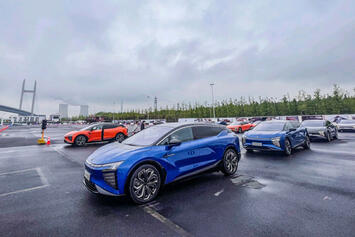
If Joe Biden loses to Donald Trump this November, he can apportion blame towards his administration’s many unforced errors, from the botched Afghanistan bug-out to the mess at the southern border. But the biggest blunder of all has yet to fully reveal itself: the ill-conceived drive to push electric vehicles into making up over three-fifths of all car purchases by the 2030s.
Just last week the administration issued a draconian mileage requirement, one of many ‘nudge’ policies attempting to usher in an all-electric future. Replacing a massive $3 trillion industry with a singular technology represents a severe economic threat under any circumstances, but ramming through changes just as EV sales are slowing is nothing less than madness.
Rarely has a policy brought such negative economic and ultimately political implications. EVs today are simply not practical for most people, unable to afford the higher costs and wary of a charger infrastructure that is far from ready for prime time.
The average price for a brand-new EV is over $60,000, about $12,000 more than the average four-door sedan. Even with tax credits, it is hard to see how consumers come out ahead, at least for now. The electric version of the base version of the Ford F-150 pickup truck, the best-selling vehicle in America, costs an additional $26,000 over the gasoline-powered variety. EVs are not affordable for most Americans: it’s little wonder that only 16 per cent of them are seriously considering a purchase.
It’s not that consumers are opposed to all electric-aided cars. Customers are willing to line up for gas-saving hybrids, which are cheaper to produce and infinitely more practical for most people at this time. But the EVs promoted by the Biden administration are simply unaffordable. As even the Washington Post admitted, electric vehicles are turning the automobile back into a luxury – “out of reach for many”.
Yet Biden and his green backers seem impervious to any reality that doesn’t fit their ideology. In addition, there’s big money to be made by cashing in on government mandates, much as state monopolies have done over the centuries. These mandates have helped make Elon Musk among the world’s richest people, and left Tesla valued far above a more profitable competitor like Toyota.
The current EV market cannot sustain the unionised, Detroit-centered auto industry that depends overwhelmingly on trucks, SUVs and traditional gas cars. A move to produce electric cars would be a job-shredder: the production of electric cars requires 30 per cent less domestic labour in the US.
Read the rest of this piece at Telegraph.
Joel Kotkin is the author of The Coming of Neo-Feudalism: A Warning to the Global Middle Class. He is the Roger Hobbs Presidential Fellow in Urban Futures at Chapman University and and directs the Center for Demographics and Policy there. Learn more at joelkotkin.com and follow him on Twitter @joelkotkin.
Photo: Durian, via Wikimedia under CC 4.0 License.












